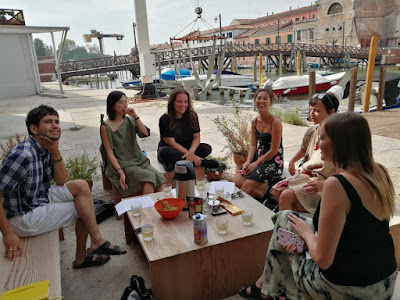Sites of Resistance 2; The chair
During the first two weeks of our work at the pavilion , tensions have emerged regarding the lack of chairs for fellows to rest on during the long shift in the gallery. This generated a series of discussions extended over time between the British Council, the artist, our managers in Venice and oursleves as fellows.
Expression of discontent; chairs as a site of resistance at the pavilion
I recorded sites of resistance during this period as a mode which inspired a direction for this research.
After a month of back and forth discusions( also discussed with the previous group), a chair- one chair- was finally delivered at the pavilion.

Expression of discontent; chairs as a site of resistance at the pavilion
I recorded sites of resistance during this period as a mode which inspired a direction for this research.
After a month of back and forth discusions( also discussed with the previous group), a chair- one chair- was finally delivered at the pavilion.
'The offending chair'
The chair had received the approval from the artist as an object which could enter the space without disrupting the content of the work, but was soon recognised as uncomfortable and unfit for the purpose of relieving 6 workers in the gallery.
This chair issue was later solved but nevertheless left a trace in my mind (and my lower back).
I set out to record the presence (or absence) of chairs around the biennale.
Some claiming a sense of power, some rendered un-usable by becoming objects of art which are not- to-be-touched, some just left unused or abandoned.
All carrying meanings and developing a discourse around empowerment, social position, care, freedom(or lack of), desilution, exhaustion or hope and beliefs.
I chose to share this series of images as unreferenced contributions to my thought process accross the biennale, which added to my analysis of resistance.
I leave you to decide their meaning, place, original or displaced purpose (or lack of), their role as objects of discontent or peacemakers and comfort, and the resistance which they provoke as a site which produces new knoweldge.

to be continued...




























Comments